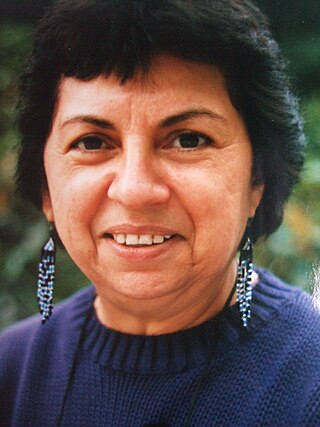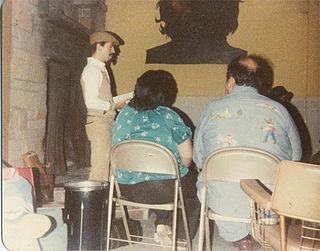
Gloria Evangelina Anzaldúa was an American scholar of Chicana feminism, cultural theory, and queer theory. She loosely based her best-known book, Borderlands/La Frontera: The New Mestiza (1987), on her life growing up on the Mexico–Texas border and incorporated her lifelong experiences of social and cultural marginalization into her work. She also developed theories about the marginal, in-between, and mixed cultures that develop along borders, including on the concepts of Nepantla, Coyoxaulqui imperative, new tribalism, and spiritual activism. Her other notable publications include This Bridge Called My Back: Writings by Radical Women of Color (1981), co-edited with Cherríe Moraga.
The Society for Crypto-Judaic Studies ("SCJS"), founded in August 1990 by Rabbi Joshua Stampfer of Portland, Oregon, and Dr. Stanley Hordes of Santa Fe, New Mexico, is the major academic organization conducting and encouraging research on the Crypto-Jews of Spain and Portugal and their descendants today. This also involves significant attention being given to the Inquisition and to its ramifications for Sephardic Jews as well as for the general Jewish community.
José Antonio "Tony" Burciaga was an American Chicano artist, poet, and writer who explored issues of Chicano identity and American society.
Latino poetry is a branch of American poetry written by poets born or living in the United States who are of Latin American origin or descent and whose roots are tied to the Americas and their languages, cultures, and geography.

Alberto Baltazar Urista Heredia, better known by his nom de plume Alurista, is an American poet and activist. His work was influential in the Chicano Movement and is important to the field of Chicano poetry.

Chicano poetry is a subgenre of Chicano literature that stems from the cultural consciousness developed in the Chicano Movement. Chicano poetry has its roots in the reclamation of Chicana/o as an identity of empowerment rather than denigration. As a literary field, Chicano poetry emerged in the 1960s and formed its own independent literary current and voice.

Joy Harjo is an American poet, musician, playwright, and author. She served as the 23rd United States Poet Laureate, the first Native American to hold that honor. She was also only the second Poet Laureate Consultant in Poetry to have served three terms. Harjo is a citizen of the Muscogee Nation and belongs to Oce Vpofv. She is an important figure in the second wave of the literary Native American Renaissance of the late 20th century. She studied at the Institute of American Indian Arts, completed her undergraduate degree at University of New Mexico in 1976, and earned an MFA degree at the University of Iowa in its creative writing program.

Juan Felipe Herrera is an American poet, performer, writer, cartoonist, teacher, and activist. Herrera was the 21st United States Poet Laureate from 2015 to 2017. He is a major figure in the literary field of Chicano poetry.

Lorna Dee Cervantes is an American poet and activist, who is considered one of the greatest figures in Chicano poetry. She has been described by Alurista as "probably the best Chicana poet active today."

Borderlands/La Frontera: The New Mestiza is a 1987 semi-autobiographical work by Gloria E. Anzaldúa that examines the Chicano and Latino experience through the lens of issues such as gender, identity, race, and colonialism. Borderlands is considered to be Anzaldúa’s most well-known work and a pioneering piece of Chicana literature.

Francisco Xavier Alarcón was a Chicano poet and educator. He was one of the few Chicano poets to have "gained recognition while writing mostly in Spanish" within the United States. His poems have been also translated into Irish and Swedish. He made many guest appearances at public schools so that he could help inspire and influence young people to write their own poetry especially because he felt that children are "natural poets."

Andrés Montoya was a Chicano poet.
Valerie Martínez is an American poet, writer, educator, arts administrator, consultant, and collaborative artist. She served as the poet laureate of Santa Fe, New Mexico from 2008 to 2010.

Rossy Evelin Lima-Padilla is a United States-based Mexican writer, scholar, translator and activist. She has published her work in numerous journals, magazines and anthologies in Europe, North America and South America.
Lucha Corpi is a Chicana poet and mystery writer. She was born on April 13, 1945, in Jaltipan, Veracruz, Mexico. In 1975, she earned a B.A. degree in comparative literature from the University of California, Berkeley. In 1979, she earned an M.A. in comparative literature from San Francisco State University. Corpi's most important contribution to Chicano literature, a series of four poems called "The Marina Poems", appeared in the anthology The Other Voice: Twentieth-Century Women's Poetry in Translation, which was published by W. W. Norton & Company, in 1976 (ISBN 9780393044218).
Margarita Cota-Cárdenas is an American poet and author. A voice for Chicano literature, Cota-Cárdenas is known for her 1985 novella Puppet: A Chicano Novella and her works of poetry. She is a professor emerita of Spanish at Arizona State University.
Levi Romero is an American poet, academic, architect, and lecturer in creative writing and Chicano studies at the University of New Mexico. In 2012, he was named the centennial poet for New Mexico.
Georgina Herrera was a Cuban writer of poetry, novels and short stories. She also wrote drama and scripts for radio and television series, as well as for film.

Emmy Pérez is a Chicanx poet and writer originally from Santa Ana, California, United States. She was a recipient of a National Endowment for the Arts Poetry Fellowship in 2017. She has lived in the borderlands of Texas since 2000, where she has taught creative writing in college and MFA programs, as well as in detention facilities and as part of social justice projects. Her latest collective is Poets Against the Border Wall. She was also a fellow (2010–12) and organizing committee member of CantoMundo (2018–19) and is a long-time member of Macondo Writers Workshop.











